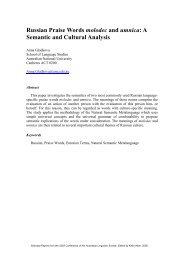ALS 2010 Annual Conference Programme - Australian Linguistic ...
ALS 2010 Annual Conference Programme - Australian Linguistic ...
ALS 2010 Annual Conference Programme - Australian Linguistic ...
Create successful ePaper yourself
Turn your PDF publications into a flip-book with our unique Google optimized e-Paper software.
Joint <strong>ALS</strong>/ALAA Colloquium<br />
Convenor/Chair: Helen Moore (University of New South Wales)<br />
helenmmoore@optusnet.com.au<br />
Learning Standard <strong>Australian</strong> English: what do we mean?<br />
This colloquium explores what might and should be understood in advocating for<br />
support in <strong>Australian</strong> schools for speakers of non-standard English varieties who are<br />
learning standard <strong>Australian</strong> English.<br />
Part 1: Standard <strong>Australian</strong> English: the Correct Educational Goal?<br />
Susan Butler (Macquarie Dictionary, University of Sydney)<br />
I discuss what is meant by Standard <strong>Australian</strong> English by drawing from the Macquarie<br />
Dictionary in regard to aspects of lexicon, usage and pronunciation. It<br />
emerges that ‘standard’ is code for a prestige form of <strong>Australian</strong> English accepted<br />
in certain social situations. I argue that, although it is good that <strong>Australian</strong> English is<br />
accepted as a reality, as is also the goal of assisting students to gain competency<br />
in it, the use of ‘standard’ creates unnecessary confusion in educational contexts.<br />
Pam Peters (Macquarie University)<br />
Standard <strong>Australian</strong> English (SAE) is often proposed as the target variety for English<br />
language learners and speakers of other English varieties in Australia. This paper<br />
raises some linguistic problems in making SAE the pedagogical target for these<br />
learners, whose needs may differ according to their mother tongues and/or their<br />
different varieties of “settler” and “indigenised” English.<br />
Discussant: Jeff Siegal (University New England)<br />
Part 2: Standard <strong>Australian</strong> English in Aboriginal & Torres Strait Islander<br />
Educational Contexts<br />
Ian Malcolm (Edith Cowan University)<br />
Teaching and testing that recognise only standard English implicitly attribute this<br />
variety to Aboriginal English speakers as their “language” – with negative consequences<br />
for both learners and educators. The educational task assumes a<br />
foundation that may not exist, confirming for many learners the impenetrability<br />
of non-Indigenous ways of structuring knowledge and that schooling is irrelevant.<br />
Jakelin Troy (University of Canberra)<br />
In NSW Aboriginal and Torres Strait Islander students continue to experience educational<br />
disadvantage because the varieties of Aboriginal English and other ’contact<br />
languages’ they use are not formally recognised, let alone dealt with effectively.<br />
I consider the development of NSW Pidgin and other contact language<br />
and English varieties and their implications for NSW schools.



